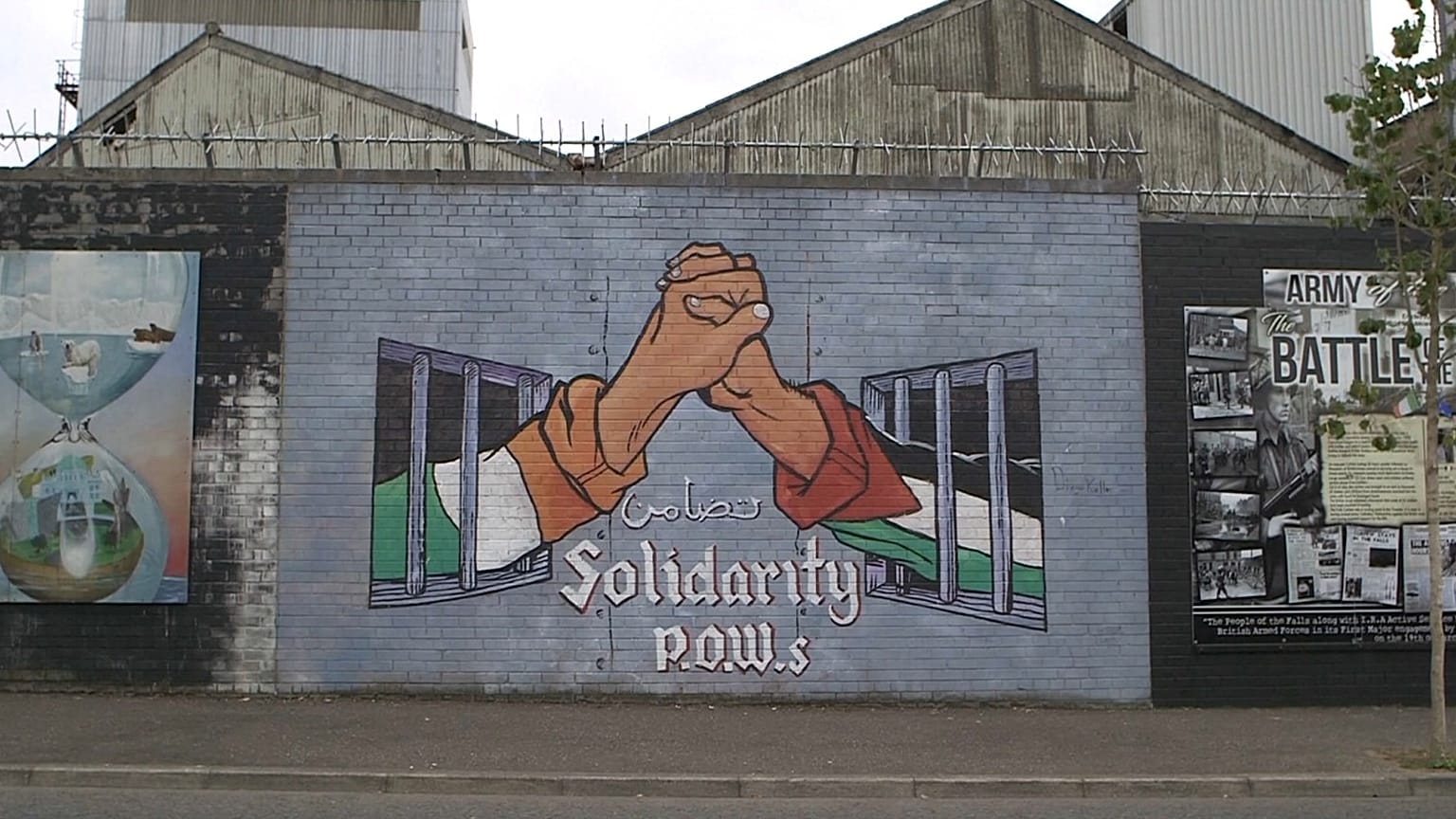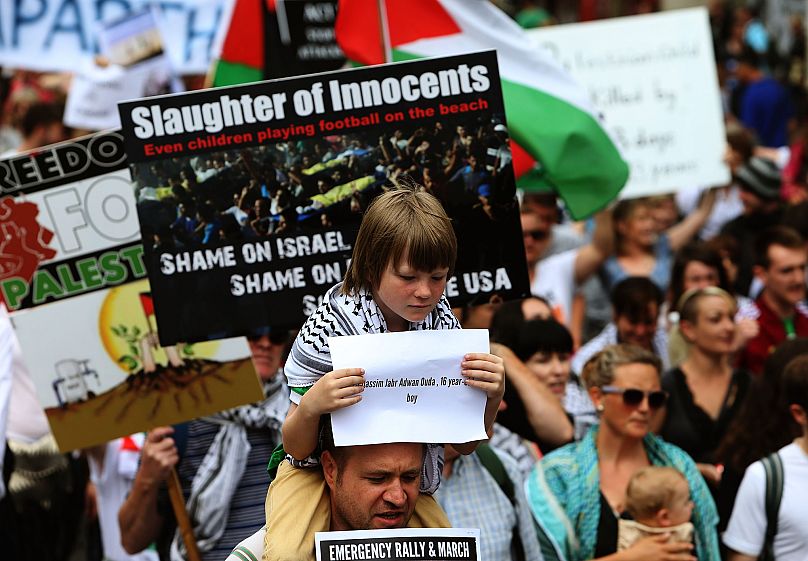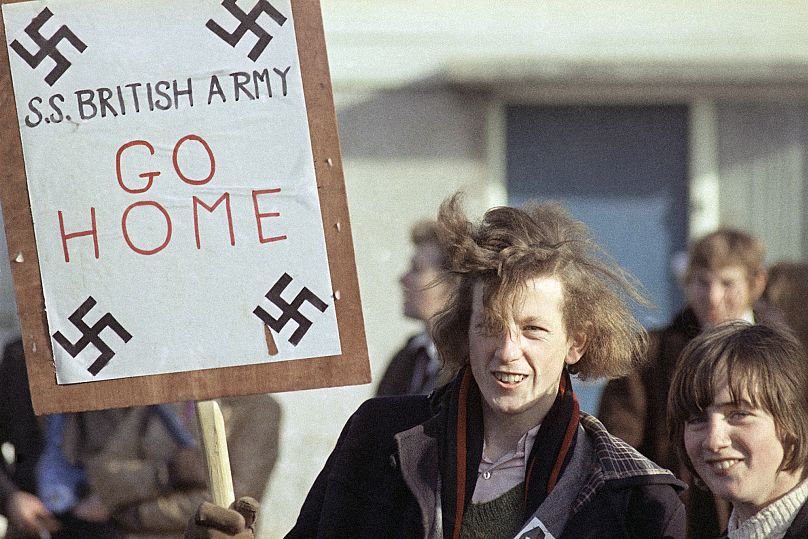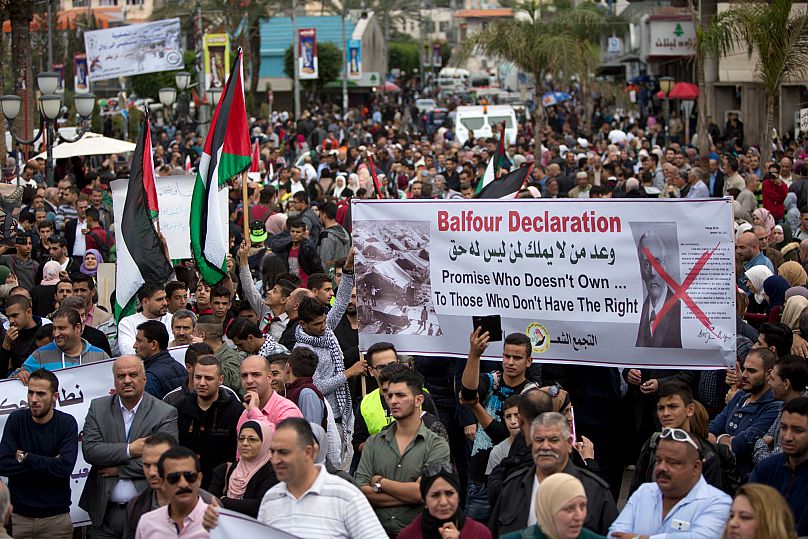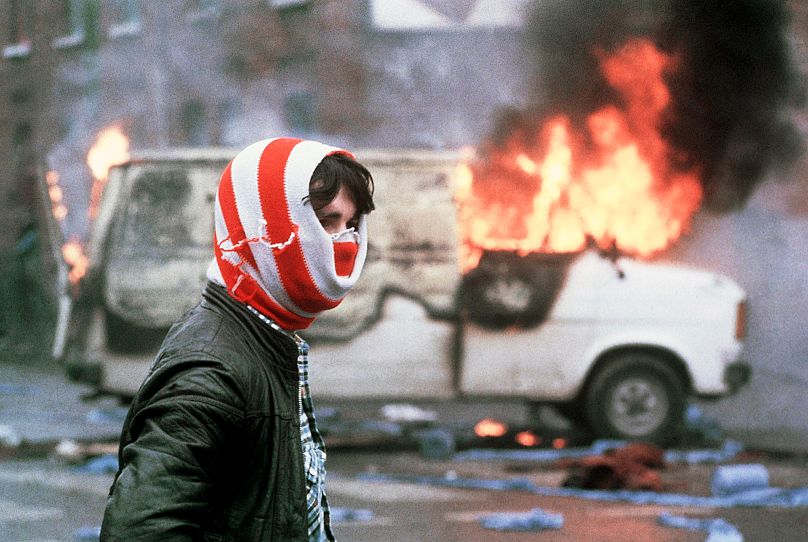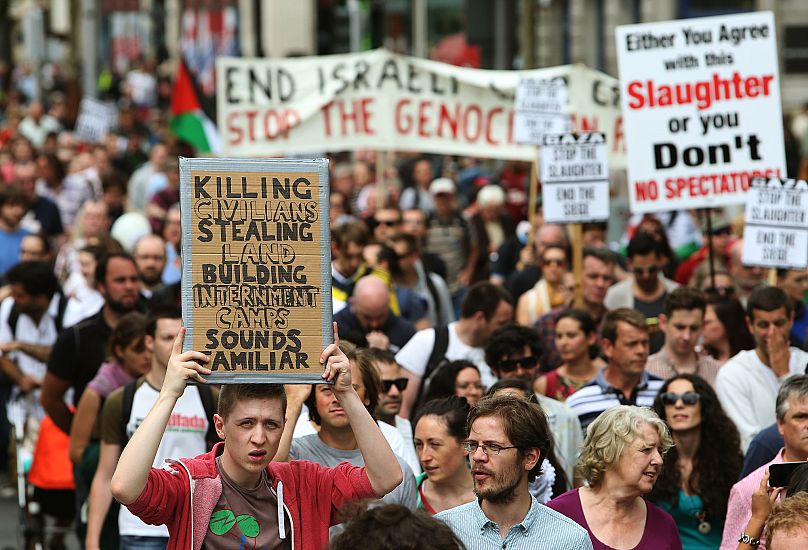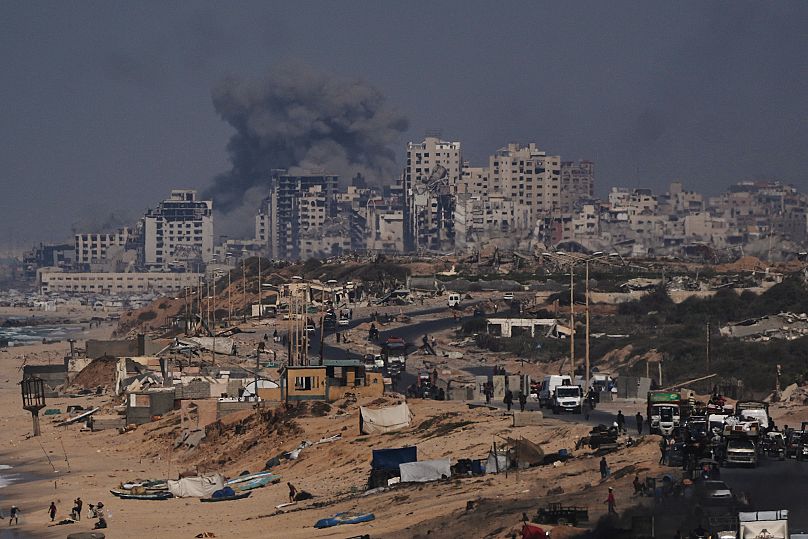Dublin's pro-Palestinian positions are rooted in Ireland's experience of the British occupation and anti-colonial policies, experts tell Euronews.
 ADVERTISEMENT
ADVERTISEMENT
Earlier this month, Ireland threatened to withdraw from the Eurovision Song Contest if Israel's bid were to proceed.
"RTÉ believes that Ireland's participation would be unacceptable given the appalling loss of life that continues in Gaza", Irish public broadcaster said in a press release on 12 September.
The move was the latest in a long line of demonstrations, boycotts and calls for sanctions, as the majority of Irish people remain highly supportive of Palestine and critical of Israel.
71% of those polled believe that the Palestinians live in an apartheid set up by Israel, according to a poll carried out in November 2023 on a representative sample of 1,387 people and a margin of error of 2.7% by the polling institute Ireland Thinks on behalf of the Irish Anti-Apartheid Campaign for Palestine (IAACP), a coalition of 23 Irish civil society organisations.
This pro-Palestinian sentiment is present across the political spectrum, as demonstrated by another IAACP survey from 2024.
Among those polled, the supporters of two major parties, centrist Fianna Fáil (71%) and centre-right Fine Gael (56%), agreed with the statement that Palestinians live in a system of apartheid set up by Israel.
This trend is more pronounced on the left, among supporters of the far-left People Before Profit–Solidarity party (100%), the Labour Party (90%), and the Social Democrats (86%). Conversely, only supporters of the conservative Aontú party are not on the same page (41% in favour).
The use of the term apartheid in the Palestinian context refers to the system of occupation and segregation of Palestinians put in place by Israel since 1967, which Israel contests.
For its part, Ireland officially recognised the State of Palestine on 28 May 2024, alongside Norway and Spain, a move slammed by Israel at the time.
"Ireland, if your goal was to reward terrorism by declaring support for a Palestinian state, you've achieved it. (President) Simon Harris, Hamas thanks you for your service,"
While Dublin remains one of the staunchest supporters of Palestine in the EU, it is essential to remember that other European countries preceded its motion to recognise it.
Warsaw Pact countries such as Hungary, Poland and Bulgaria, for example, recognised Palestine in 1988, much before joining the EU. To date, 16 out of 27 EU countries recognise the Palestinian state.
Why are the Irish backing Palestine?
Irish support for the Palestinian cause is rooted in parallels with their own experience of the British occupation, according to Brendan Ciarán Browne, associate professor at Trinity College Dublin.
Ireland experienced seven centuries of rule under Britain's authority, which began with the Anglo-Norman invasion in the 12th century and continued until the establishment of the Irish Free State in 1922.
"Our own history of ... violent, British colonisation, gives us this kind of almost natural empathy towards other colonised peoples," says Brendan Ciarán Browne.
From 1845 to 1852, Ireland experienced forced displacement and the Great Famine, known in Irish as "an Drochshaol" or "the hard times", which killed more than a million Irish out of a population of eight million.
It was triggered by the devastation of potato crops by blight and made worse by the lack of support or aid strategy from London.
"Indigenous laws and customs, heritage, art and language have been erased or attempted to be erased by colonial violence. And this is something that is also shared by the Palestinians," Browne said.
There are also the Black and Tans, a corps of World War I veterans integrated into the British police force from 1920 onwards to fight against Irish independence fighters, and were found responsible for numerous acts of violence against civilians.
When the Irish Free State became independent in 1922, some Black and Tans officers were deployed to British Mandate Palestine, where they replicated the forms of torture and police brutality tested in Ireland.
British figures played a role in the history of both the Irish and the Palestinians. In 1917, the British Foreign Secretary Arthur Balfour published a letter in which he declared that the United Kingdom was in favour of the creation of a Jewish national home in Palestine.
The Balfour Declaration is therefore regarded as a crucial step towards the establishment of the State of Israel in 1948. Previously secretary of state for Ireland and then UK prime minister, he opposed Home Rule, a project initiated by Irish nationalists in favour of Irish autonomy, earning the name "Bloody Balfour" for his brutal repression of the Irish nationalist movement.
Dublin's support for the Palestinian cause can also be partly explained by its experience of the peace process in Northern Ireland.
The Northern Irish conflict, which pitted Catholic nationalists, including Sinn Féin and its armed wing the IRA, against Protestant unionists supported by the United Kingdom, ended in 1998 with the Good Friday Agreement.
Northern Ireland remained part of the United Kingdom. A local assembly was elected, a cabinet was created, and paramilitary groups were disarmed.
"Ireland often offers its services to try and transpose or share its experience of the peace process in other territories, and in particular here in relation to the Middle East conflict", Marie-Violaine Louvet, a lecturer at Toulouse Jean Jaurès University, told Euronews.
For decades, Irish leaders have advocated in favour of the Palestinians and the Palestinian state as a way of promoting a peaceful solution to the conflict in the Middle East, Louvet pointed out.
Frank Aiken, Ireland's foreign minister in the 1950s and 1960s, was a vocal advocate for the Palestinians in the United Nations General Assembly.
In 1958, he defended the right of return and compensation for Palestinian refugees, and in 1967 he called for the withdrawal of Israeli forces to the borders between Israel and its Arab neighbours before the Six-Day War.
"From a diplomatic point of view, the Republic of Ireland has presented itself as a defender of human rights, by virtue of its colonial history, and has taken up the Palestinian question by defending in particular the right of return of Palestinian refugees," explained Louvet.
From the end of the 1950s, Dublin contributed to the budget of UNRWA, the United Nations relief agency for the Palestinians, and provided soldiers to the United Nations Observation Group in Lebanon (UNOGIL).
In 1974, Ireland was one of the first European countries to recognise the Palestine Liberation Organisation (PLO) as the representative of the Palestinians.
At the same time, it was the last EU country to welcome an Israeli embassy in 1996, even though it had recognised the State of Israel in 1949, a decision Dublin formalised in 1963.
What is the role of the Irish civil society?
Louvet believes that "there is a widespread and widespread feeling of solidarity with Palestine, but the party that carries this feeling most strongly is Sinn Féin, the republican party, a left-wing nationalist party that has had historic links with the Palestine Liberation Organisation, historically and continuously since the late 1960s".
The strong mobilisation of civil society is also playing a key role.
The Irish Congress of Trade Unions is one of the first union federations in Europe to support the "Boycott, Divestment, Sanctions" (BDS) campaign, launched by Palestinian civil society in 2005 to put pressure on Israel.
The BDS movement, presented as non-violent by its supporters but branded as antisemitic by Israel, has been seen as controversial and condemned or banned in some countries.
In the United States, a total of 38 states have taken legal measures against organisations linked to the BDS movement. In Ireland, the BDS movement's popularity has been on the rise, according to domestic media reports.
"Civil society is a driving force in the sense that it manages to influence the political class", said Louvet.
In early September, the Central Bank of Ireland stopped approving the sale of Israeli bonds on European markets, following a campaign by civil society. These bonds enable Israel to raise funds during the Israel-Hamas war in Gaza.
Following Brexit, Ireland was responsible for validating this procedure for the entire EU. Israel has now requested that approval be transferred to Luxembourg.
However, Browne believes the Irish government has limited itself to "symbolic gestures".
"When we look at support for the Palestinian cause, it is driven by people on the ground, activists, citizens' movements and not necessarily the government," he said.
The picture is more mixed in Northern Ireland, where Catholic republicans in favour of reunification with the Republic of Ireland support the Palestinians. At the same time, Protestant unionists show their solidarity with Israel.
However, Dublin's action came up against its close political and economic ties with the US, which remains Israel's key ally.
The US is the number one destination for Irish exports. According to the American Chamber of Commerce (AmCham), over 970 US companies employ more than 211,000 people in Ireland.
This represents around 7.5% of the Irish working population, as around 2.8 million people were in employment in the second quarter of 2025, according to the Irish Central Statistics Office.
"Ireland has a very strong bond with America, and will be very reluctant to do anything that would damage that relationship," said Browne.














